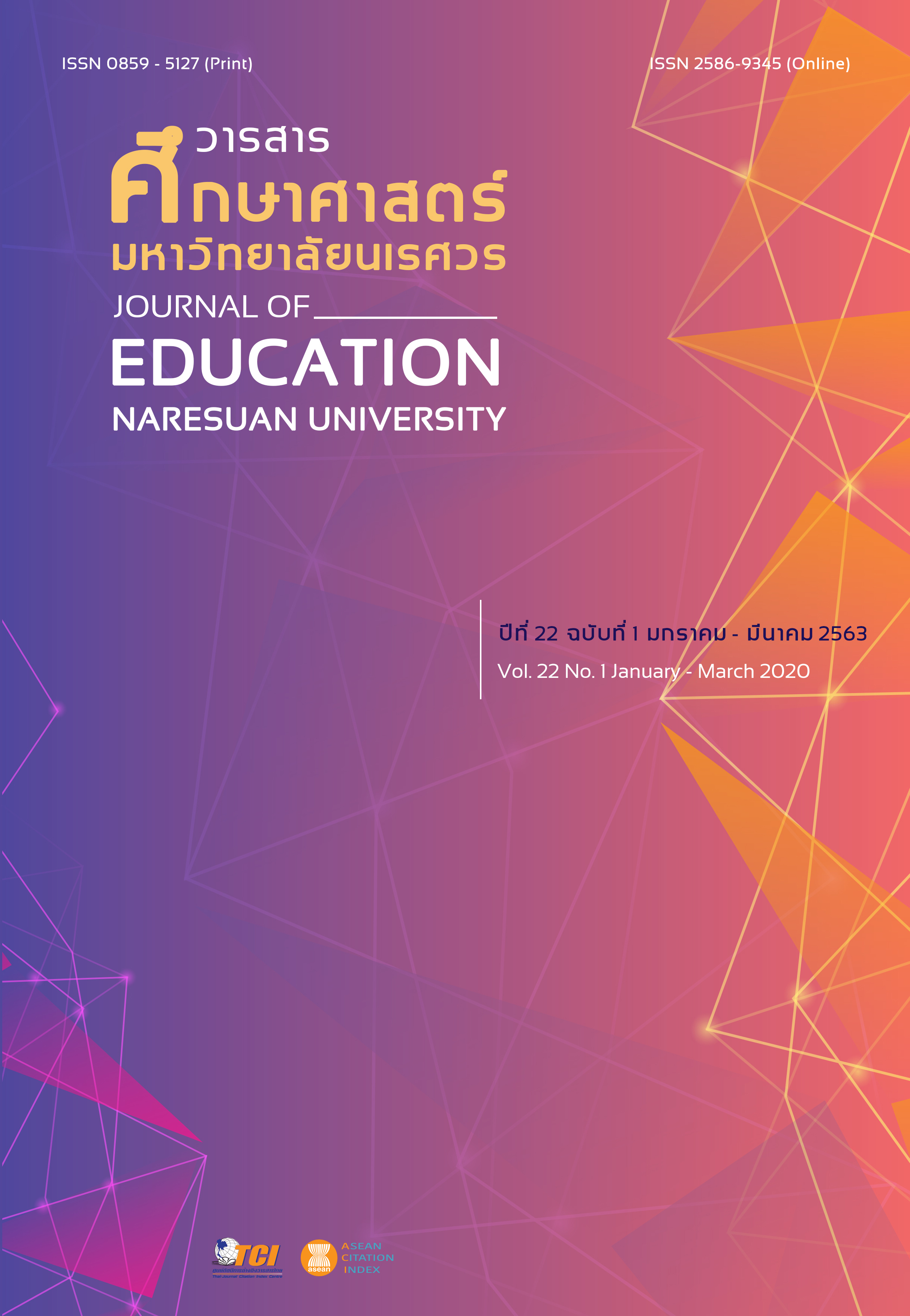THE DEVELOPMENT OF BIOLOGY INSTRUCTIONAL MODEL TO ENHANCE ANALYTICAL THINKING CRITICAL THINKING AND PROBLEM SOLVING THINKING SKILLS OF MATHAYOMSUKSA SIX STUDENTS
Main Article Content
Abstract
The purposes of this research were to develop and to implement the biology instructional model to enhance analytical thinking, critical thinking and problem solving thinking skills. The sample were forty-six Mathayomsuksa 6 students of Chonrasadornumrung School of the second semester 2016. The cluster random sampling method was used to select the sample. The research instruments were lesson plans based on the model, analytical thinking test, critical thinking test, problem solving thinking test, science achievement test and attitude towards biology subject test. The statistics used for data analysis were mean, standard deviation and t-test. The research results were as follows:
1. The developed biology instructional model for the enhancement of analytical thinking, critical thinking and problem solving thinking skills, comprised of four major components: 1) the principle, 2) the objectives, 3) the learning process (with eight stages : Stimulus Recall of Prior Learning, Objectives, Native Knowledge, Group Processing, Sharing, Expansion, Re-educate and Monitoring), and 4) the result of studying from the instructional model. The Evaluation of appropriate model by the experts was at the high level ( = 4.49).
2. The results of implementing the instructional model showed that the posttest scores of the students having analytical thinking test, critical thinking test, problem solving thinking test, biology achievement test were higher than the pretest at the .05 level of statistical significance. The attitude towards biology subject of the sample group after the learning by this instructional model was at the high level ( = 3.87).
Article Details
The owner of the article does not copy or violate any of its copyright. If any copyright infringement occurs or prosecution, in any case, the Editorial Board is not involved in all the rights to the owner of the article to be performed.
References
Art-in, S. (2007). Learning management to develop critical thinking. Journal of Curriculum and Instruction, Konkaen University, 2(1), 12-21. [in Thai]
Bloom, B. S., Engelhart, M. D., Frust, E. J., Hill, W. H., & Krathwohl, D. (1972). Taxonomy of educational objectives: Handbook 1 cognitive domain (7th ed.). New York: David Mckay Company.
Bunteng, T. (2012). Student skills assessment international PISA 2012. Retrieved October 8, 2016, from https://blog.eduzone.com/tonsungsook/120382 [in Thai]
Choangchan, A. (2010). The development of instructional model for the enhancement of problem solving with critical thinking abilities of fifth grade students (Doctor dissertation). Bangkok: Silpakorn University. [in Thai]
Chiras, D. D. (1992). Teaching critical thinking skills in the biology & environmental science classrooms. The American Biology Teacher, 54, 464-468.
Chuabangkaew, M. (2013). The Development of instructional model to promote analytical thinking integrated science process skills and scientific attitude (Doctoral dissertation). Chonburi: Burapha University. [in Thai]
Deechauy, J. (2011). The development of instructional model based on constructivism and critical thinking to enhance biology concepts and knowledge construction abilities of tenth grade students (Doctoral dissertation). Bangkok: Silpakorn University. [in Thai]
Gall, M. D., Borg, W. R., & Gall, J. P. (1996). Educational research: An introduction (6th ed.). New York: Longman Publishers.
Jammor, P., Prasarnpun, S., Kaewurai, K., & Lhincharoen, A. (2016). The development of blended learning management model in biology using resource based learning to enhance learning avidity of high school students. Journal of Education Naresuan University, 18(2), 37-49. [in Thai]
Khemmani, T. (2002). Science of teaching: A body of knowledge for effective learning management (2nd ed.). Bangkok: Chulalongkorn University Press. [in Thai]
Mcmillan, J. H., & Schumacher, S. (2006). Research in education: Evidence – based inquiry (6th ed.). Boston: Pearson Education.
Ministry of Education. (2009). The Basic Education Core Curriculum B.E. 2551 (A.D. 2008). Bangkok: The Agricultural Cooperative Federation of Thailand. [in Thai]
National Institute of Educational Testing Service (Public Organization). (2015). Ordinary Seven subjects test in 2014. Retrieved October 22, 2015, from https://www.niets.or.th [in Thai]
Saiyod, L., & Saiyod, A. (2000). Technique of measurement and learning (2nd ed.). Bangkok: Suweeriyasarn. [in Thai]
Sinthapanon, S., Wanlerdluck, W., & Sinthapanon, P. (2009). Thinking development for teaching (2nd ed.). Bangkok: Laing Chaing Company. [in Thai]
Somongdee, T. (2013). The effect of biology learning in genetic inheritance by using the 7E-learning cycle on learning achievement, analytical thinking and scientific attitudes of mathayomsuksa four students (Master thesis). Chonburi: Burapha University. [in Thai]
The Institute for the Promotion of Teaching Science and Technology. (2004). The Instructional model to develop higher order thinking in biology. Retrieved July 22, 2014, from https://www.biology ipst.ac.th [in Thai]
Turiman, P., Omar, J., Daud, A. M., & Osman, K. (2012). Fostering the 21st century skills through scientific literacy and science process skills. Procedia-Social and Behavioral Sciences, 59, 110-116.


